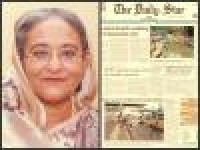Dhaka media controversy: enraged by a picture
A picture of an Islamist in a Dhaka paper has aroused the anger of the Prime Minister.
As SUBIR BHAUMIK reports, the media disagree on what this signifies.

Bangladesh Prime Minister Sheikh Hasina has lashed out at a picture of a poster of Islamist radical Hizb-ur-Tahrir carried by the country’s largest-circulated English daily the Daily Star on February 11 with the caption -- 'Fanatics raise their ugly head again'.
A week after the picture was carried, Hasina told Parliament that publishing a copy of the poster of the banned Islamist group was actually helping the radical cause.
"We will move against those who help the Hizb-ut-Tahrir by publishing their posters in the paper," she said. "I don’t care whether they have written positively or negatively but by blowing up the visual image of this nondescript poster at a corner of Bangla Motor which would have attracted no attention, the paper has helped the radical cause."
Hasina appealed to the media to be mindful of the national interest while producing their publications and programmes. "They need to keep in mind what is lawful and what is unlawful," she said.
Immediately after his mother blamed the paper for helping the radical cause, Hasina’s son, Sajeeb Wajed Joy, demanded the arrest of its editor Mahfuz Anam.
Meanwhile, a local lawyer has already moved the court against the Anam and three others for carrying the visual, arguing that it could adversely impact communal harmony and law and order.
Most journalists, except those close to the ruling party and government, have described this as ‘needless over-reaction’ and there have been few takers for Hasina’s opinion that the paper can act as a ‘force multiplier’ for Hizb-ur-Tahrir.
In Bangladesh, no English daily, not even the Daily Star, can boast of mass circulation; they sell hardly a few thousand copies and circulate within the elite and the expat community.
“I don’t agree with the Prime Minister if she thinks the Daily Star gave traction to Hizb-ur-Tahrir. They just carried a picture of a poster and the headline was not encouraging,” says Toufique Imrose Khalidi, chief editor of bdnews24.com. “English papers are not read by many anyway.”
Anam’s justification was that his paper merely reported what was going on. “My paper did not try to give publicity to anybody, and when the caption said fanatics raise their ugly head, we were very clear about who these people behind the posters were. I am shocked that a leader of the stature of Prime Minister Hasina would threaten action against us.”
But Khalidi is critical of the way Anam mobilized the Editors’ Council subsequently to issue a statement that said “Bangladesh no longer has the environment for a free media.”
“We all have pressures from all quarters, the ruling party, the government and opposition, but we don’t bow down to them,” says Khalidi.
Many editors who are members of the Council blame Anam for passing such a strongly worded resolution in a meeting that was not attended by even half the members of the Editors’ Council.
“That is his (Anam’s) opinion, not ours,” says Shyamal Dutta, editor of the Bengali daily Bhorer Kagoj. “I was not present at the meeting that carried the resolution and surely that is not my view of the situation.”
During a television debate last week, Anam said: “I am not as brave as Khalidi and I am genuinely concerned at the kind of attack launched against me and my paper. I have reasons to worry."
Khalidi , who was also on the panel, pulled up Anam for ‘personalising the agenda’ and also questioned his credibility for having endorsed the military-backed caretaker government in 2007-08.
Other senior editors in the debate were critical of both Hasina and Anam, saying both were over-reacting. “If Anam thinks the situation now is worse than what it was during the military backed caretaker which he supported, I don’t agree with him,” said Khalidi, who formerly worked at the Daily Star before joining the BBC and then returned to edit the bdnews24.com.
Bangladesh-watchers say Hasina is actually upset with the media group that publishes the Daily Star because she feels they are backing the opposition which is organizing a violent campaign for fresh elections.
As Bangladesh’s politically polarized society gets further divided over this violent agitation that has left more than 100 dead in two months, the media is fast becoming a casualty.
It is taking sides, very often blatantly and very often field journalists are feeling the heat from all sides.
The recent murder of writer-blogger Avijit Roy by suspected Islamist radicals on February 26 near the Dhaka Book Fair indicates how dangerous the country is becoming for those who freely express their opinions.
Such articles are only possible because of your support. Help the Hoot. The Hoot is an independent initiative of the Media Foundation and requires funds for independent media monitoring. Please support us. Every rupee helps.